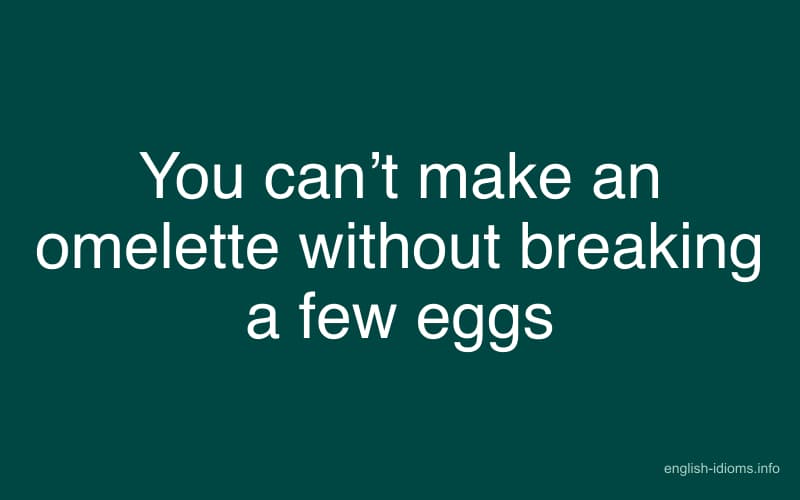English Idioms
Comprehensive resource for understanding and mastering English idioms

You can’t make an omelette without breaking a few eggs
Meaning
The idiom "you can’t make an omelette without breaking a few eggs" means that you cannot achieve a desired result or goal without causing some damage or consequences. It suggests that the process of making something new or improving something existing often involves taking risks and facing challenges that may have negative outcomes. The phrase is commonly used as a warning to caution against overly optimistic expectations or unrealistic goals that are likely to lead to disappointment.
Usage
- "I know you're excited about the new project, but you can’t make an omelette without breaking a few eggs first." (Advising someone to be realistic about the challenges they may face while working on a new project)
- "Don't expect your relationship to go smooth all the time. You can’t make an omelette without breaking a few eggs." (Suggesting that relationships often involve conflict and hardship, but can still be fulfilling)
- "If you want to achieve your goals quickly, be prepared to take some risks. You can’t make an omelette without breaking a few eggs." (Encouraging someone to take calculated risks in order to achieve their desired outcomes)
- "It's not always possible to have everything go your way. Sometimes you have to roll the dice and accept that you might break some eggs in the process." (Acknowledging that life is unpredictable and sometimes things don't turn out as planned)
- "You can’t make an omelette without breaking a few eggs, but it's worth the effort in the end." (Explaining that although achieving success may involve facing challenges and hardships, it can ultimately be worth the effort)
Roots and History
The origin of this idiom is unclear, but there are several theories about its meaning. One theory suggests that it comes from a 16th-century proverb by François Villon, a French poet, who said "Un œuf n'est pas fait sans briser un coup de faux." This translates to "An egg is not made without breaking one blow." The phrase refers to the idea that something new or valuable is often created through hardship and struggle. Another theory suggests that the idiom originated in the 19th century, when omelette was a popular dish among working-class people. Omelettes were made using eggs that were sometimes cracked or bruised, and could be salvaged by breaking them open and mixing them into the dish. This idea of breaking a few eggs to make something new suggests that sometimes you have to take risks in order to achieve your goals. Over time, the idiom has evolved to become more metaphorical, rather than purely literal. It is now used to describe any kind of challenge or obstacle that may be faced while trying to achieve something new.
Synonyms in English
- "You can't have your cake and eat it too." (Suggesting that achieving a goal requires making sacrifices)
- "If you want to make an omelette, you gotta break some eggs." (Encouraging someone to take calculated risks in order to achieve their desired outcomes)
- "No pain, no gain." (Explaining that sometimes hard work and effort are necessary to achieve success)
- "You can't make an omelette without cracking a few yolks." (Suggesting that achieving a goal may involve facing challenges or setbacks)
- "The road to success is paved with broken dreams." (Explaining that achieving success often involves facing obstacles and disappointments)
Synonyms in other languages
- 「それは、私が食べるぞ」(Japanese - "That's what I'll eat!")
- 「やだけ無法実現の目標」(Japanese - "It's impossible to achieve unrealistic goals")
- 「あなたは、一切に失敗せぬことがあるか?」(Japanese - "Is there any possibility of failure?")
- 「あなたの夢を実現するのはどうしていたよ?」(Japanese - "How did you achieve your dream?")
- 「あなたが食べるぞ!」(Korean - "You'll eat it!")